Aging Caregivers and Adults with ID
VerifiedAdded on 2020/03/04
|12
|5305
|318
AI Summary
This assignment explores the complex situation of aging parents caring for adult children with intellectual disabilities. It analyzes research on the challenges these caregivers face, including financial strain, lack of accessible support services, and difficulties planning for the future. The assignment emphasizes the importance of government intervention to provide adequate support, such as funding for care facilities, training programs for families, and policies that empower individuals with disabilities and their families.
Contribute Materials
Your contribution can guide someone’s learning journey. Share your
documents today.
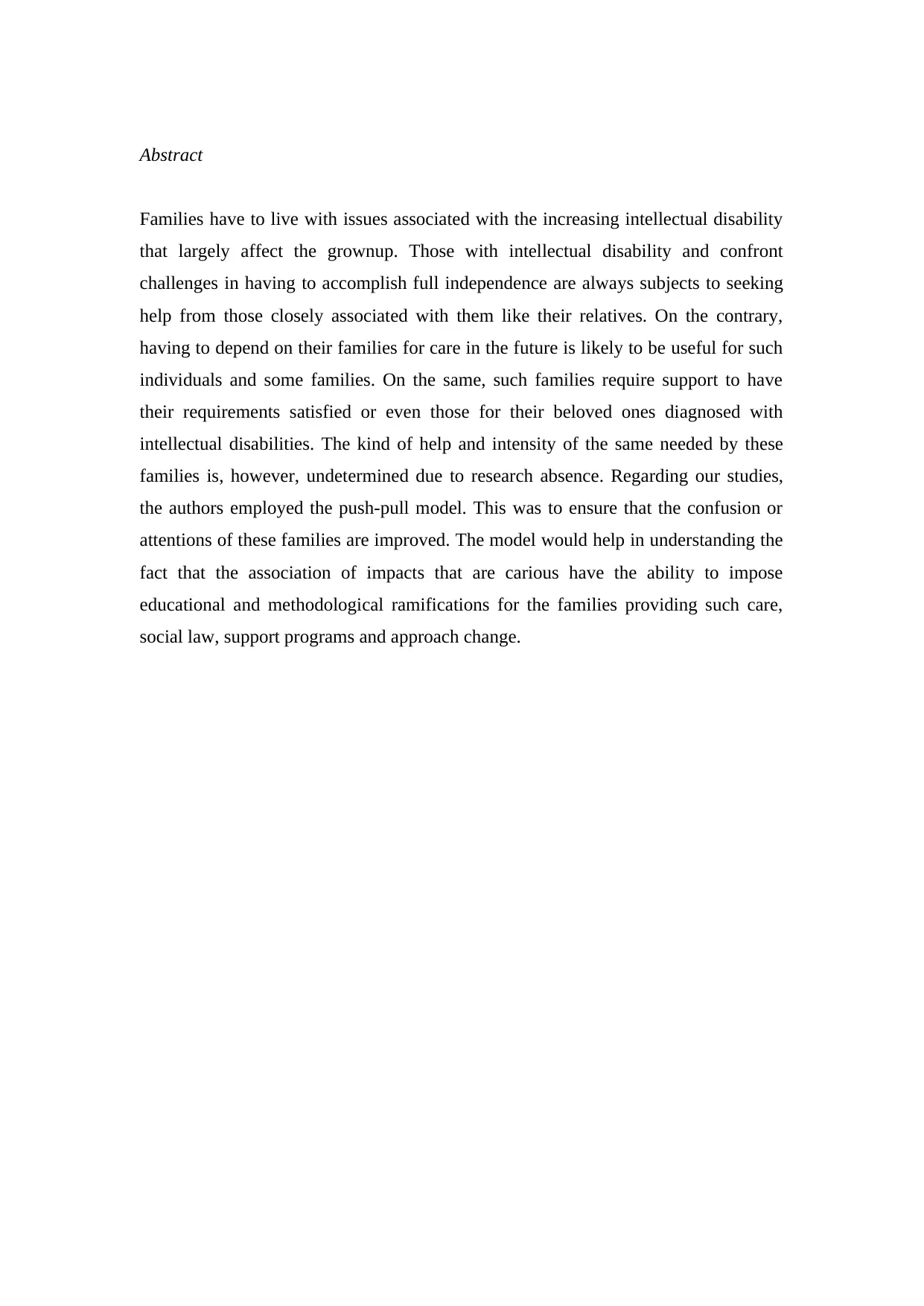
Abstract
Families have to live with issues associated with the increasing intellectual disability
that largely affect the grownup. Those with intellectual disability and confront
challenges in having to accomplish full independence are always subjects to seeking
help from those closely associated with them like their relatives. On the contrary,
having to depend on their families for care in the future is likely to be useful for such
individuals and some families. On the same, such families require support to have
their requirements satisfied or even those for their beloved ones diagnosed with
intellectual disabilities. The kind of help and intensity of the same needed by these
families is, however, undetermined due to research absence. Regarding our studies,
the authors employed the push-pull model. This was to ensure that the confusion or
attentions of these families are improved. The model would help in understanding the
fact that the association of impacts that are carious have the ability to impose
educational and methodological ramifications for the families providing such care,
social law, support programs and approach change.
Families have to live with issues associated with the increasing intellectual disability
that largely affect the grownup. Those with intellectual disability and confront
challenges in having to accomplish full independence are always subjects to seeking
help from those closely associated with them like their relatives. On the contrary,
having to depend on their families for care in the future is likely to be useful for such
individuals and some families. On the same, such families require support to have
their requirements satisfied or even those for their beloved ones diagnosed with
intellectual disabilities. The kind of help and intensity of the same needed by these
families is, however, undetermined due to research absence. Regarding our studies,
the authors employed the push-pull model. This was to ensure that the confusion or
attentions of these families are improved. The model would help in understanding the
fact that the association of impacts that are carious have the ability to impose
educational and methodological ramifications for the families providing such care,
social law, support programs and approach change.
Secure Best Marks with AI Grader
Need help grading? Try our AI Grader for instant feedback on your assignments.
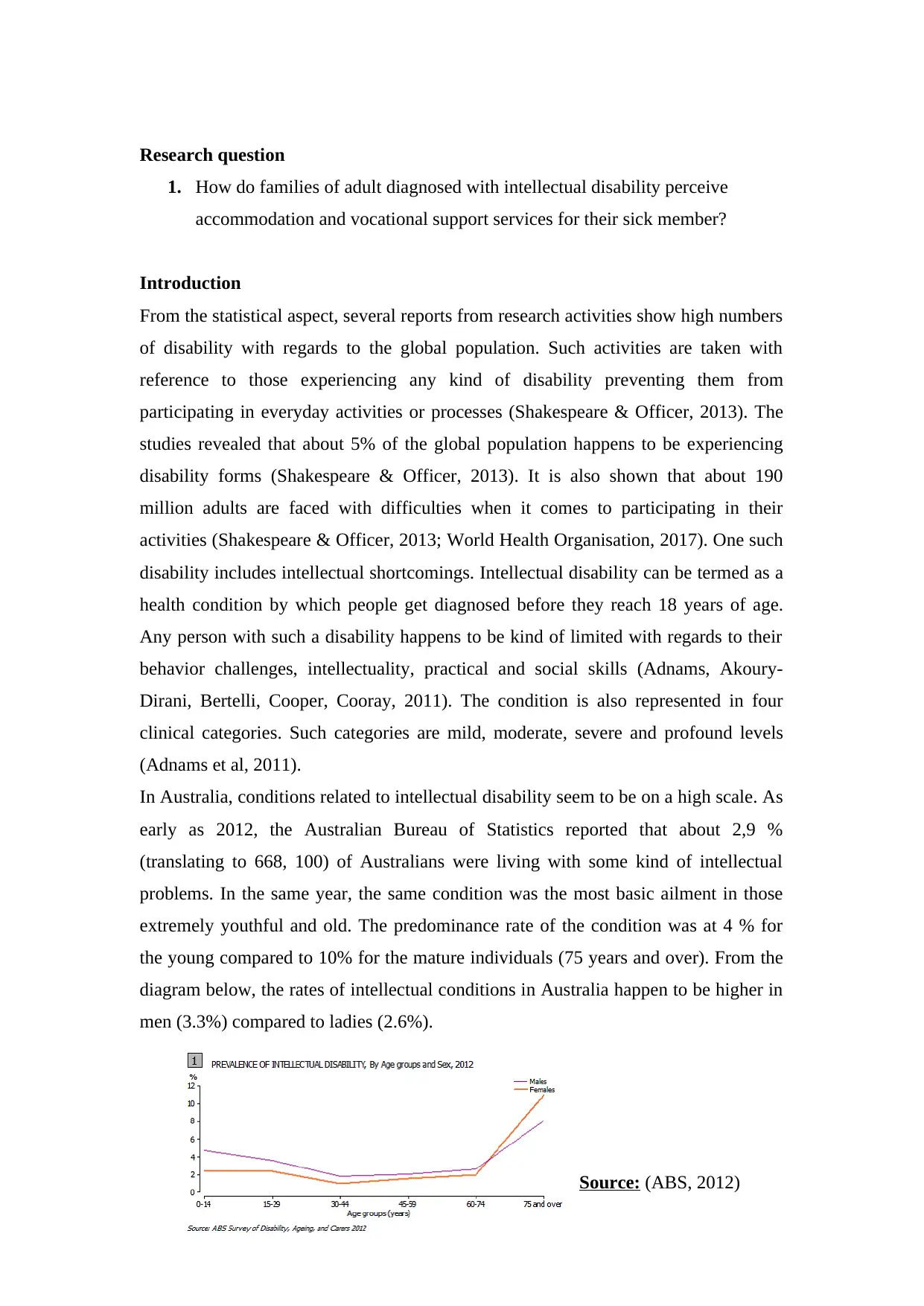
Research question
1. How do families of adult diagnosed with intellectual disability perceive
accommodation and vocational support services for their sick member?
Introduction
From the statistical aspect, several reports from research activities show high numbers
of disability with regards to the global population. Such activities are taken with
reference to those experiencing any kind of disability preventing them from
participating in everyday activities or processes (Shakespeare & Officer, 2013). The
studies revealed that about 5% of the global population happens to be experiencing
disability forms (Shakespeare & Officer, 2013). It is also shown that about 190
million adults are faced with difficulties when it comes to participating in their
activities (Shakespeare & Officer, 2013; World Health Organisation, 2017). One such
disability includes intellectual shortcomings. Intellectual disability can be termed as a
health condition by which people get diagnosed before they reach 18 years of age.
Any person with such a disability happens to be kind of limited with regards to their
behavior challenges, intellectuality, practical and social skills (Adnams, Akoury-
Dirani, Bertelli, Cooper, Cooray, 2011). The condition is also represented in four
clinical categories. Such categories are mild, moderate, severe and profound levels
(Adnams et al, 2011).
In Australia, conditions related to intellectual disability seem to be on a high scale. As
early as 2012, the Australian Bureau of Statistics reported that about 2,9 %
(translating to 668, 100) of Australians were living with some kind of intellectual
problems. In the same year, the same condition was the most basic ailment in those
extremely youthful and old. The predominance rate of the condition was at 4 % for
the young compared to 10% for the mature individuals (75 years and over). From the
diagram below, the rates of intellectual conditions in Australia happen to be higher in
men (3.3%) compared to ladies (2.6%).
Source: (ABS, 2012)
1. How do families of adult diagnosed with intellectual disability perceive
accommodation and vocational support services for their sick member?
Introduction
From the statistical aspect, several reports from research activities show high numbers
of disability with regards to the global population. Such activities are taken with
reference to those experiencing any kind of disability preventing them from
participating in everyday activities or processes (Shakespeare & Officer, 2013). The
studies revealed that about 5% of the global population happens to be experiencing
disability forms (Shakespeare & Officer, 2013). It is also shown that about 190
million adults are faced with difficulties when it comes to participating in their
activities (Shakespeare & Officer, 2013; World Health Organisation, 2017). One such
disability includes intellectual shortcomings. Intellectual disability can be termed as a
health condition by which people get diagnosed before they reach 18 years of age.
Any person with such a disability happens to be kind of limited with regards to their
behavior challenges, intellectuality, practical and social skills (Adnams, Akoury-
Dirani, Bertelli, Cooper, Cooray, 2011). The condition is also represented in four
clinical categories. Such categories are mild, moderate, severe and profound levels
(Adnams et al, 2011).
In Australia, conditions related to intellectual disability seem to be on a high scale. As
early as 2012, the Australian Bureau of Statistics reported that about 2,9 %
(translating to 668, 100) of Australians were living with some kind of intellectual
problems. In the same year, the same condition was the most basic ailment in those
extremely youthful and old. The predominance rate of the condition was at 4 % for
the young compared to 10% for the mature individuals (75 years and over). From the
diagram below, the rates of intellectual conditions in Australia happen to be higher in
men (3.3%) compared to ladies (2.6%).
Source: (ABS, 2012)
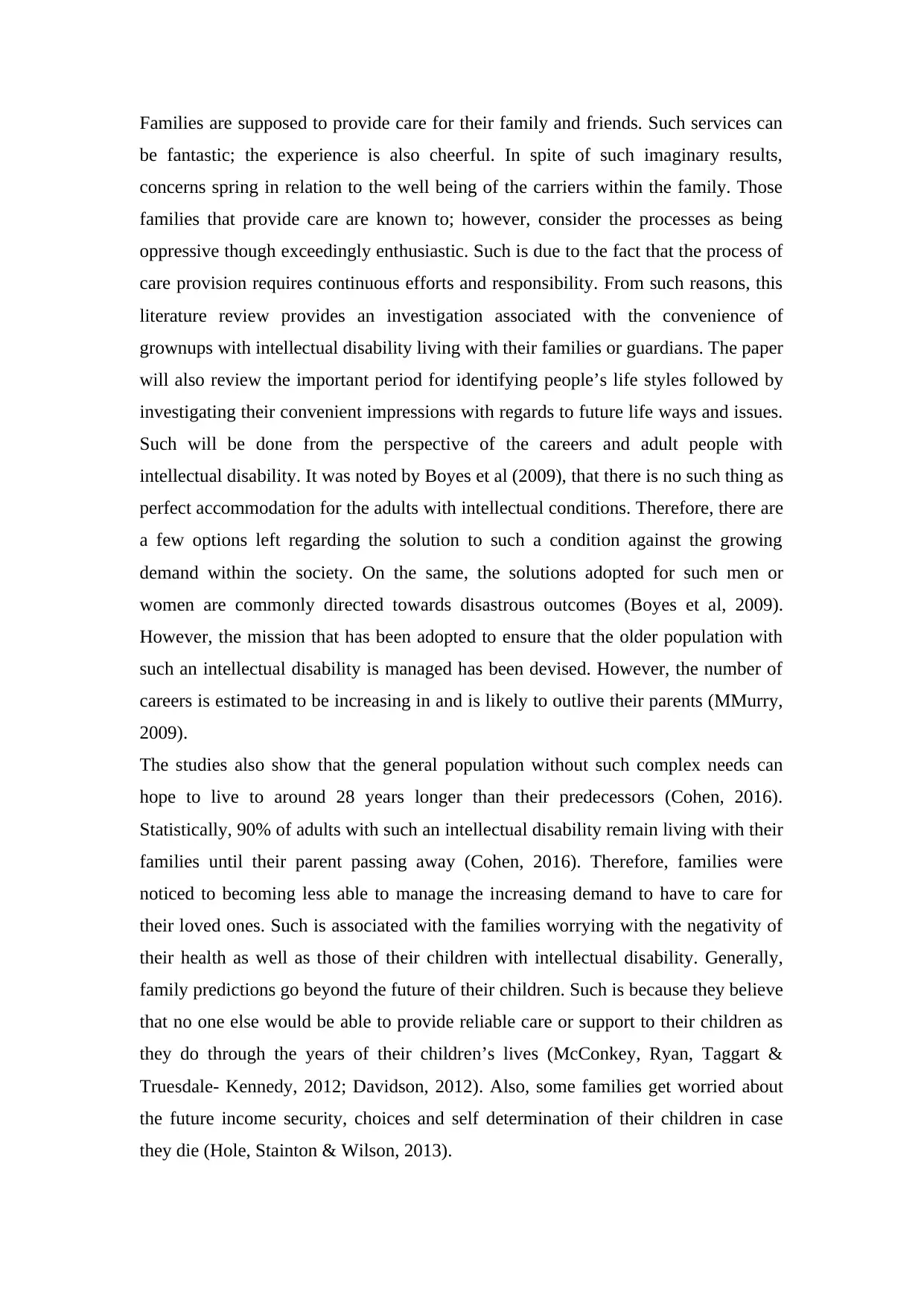
Families are supposed to provide care for their family and friends. Such services can
be fantastic; the experience is also cheerful. In spite of such imaginary results,
concerns spring in relation to the well being of the carriers within the family. Those
families that provide care are known to; however, consider the processes as being
oppressive though exceedingly enthusiastic. Such is due to the fact that the process of
care provision requires continuous efforts and responsibility. From such reasons, this
literature review provides an investigation associated with the convenience of
grownups with intellectual disability living with their families or guardians. The paper
will also review the important period for identifying people’s life styles followed by
investigating their convenient impressions with regards to future life ways and issues.
Such will be done from the perspective of the careers and adult people with
intellectual disability. It was noted by Boyes et al (2009), that there is no such thing as
perfect accommodation for the adults with intellectual conditions. Therefore, there are
a few options left regarding the solution to such a condition against the growing
demand within the society. On the same, the solutions adopted for such men or
women are commonly directed towards disastrous outcomes (Boyes et al, 2009).
However, the mission that has been adopted to ensure that the older population with
such an intellectual disability is managed has been devised. However, the number of
careers is estimated to be increasing in and is likely to outlive their parents (MMurry,
2009).
The studies also show that the general population without such complex needs can
hope to live to around 28 years longer than their predecessors (Cohen, 2016).
Statistically, 90% of adults with such an intellectual disability remain living with their
families until their parent passing away (Cohen, 2016). Therefore, families were
noticed to becoming less able to manage the increasing demand to have to care for
their loved ones. Such is associated with the families worrying with the negativity of
their health as well as those of their children with intellectual disability. Generally,
family predictions go beyond the future of their children. Such is because they believe
that no one else would be able to provide reliable care or support to their children as
they do through the years of their children’s lives (McConkey, Ryan, Taggart &
Truesdale- Kennedy, 2012; Davidson, 2012). Also, some families get worried about
the future income security, choices and self determination of their children in case
they die (Hole, Stainton & Wilson, 2013).
be fantastic; the experience is also cheerful. In spite of such imaginary results,
concerns spring in relation to the well being of the carriers within the family. Those
families that provide care are known to; however, consider the processes as being
oppressive though exceedingly enthusiastic. Such is due to the fact that the process of
care provision requires continuous efforts and responsibility. From such reasons, this
literature review provides an investigation associated with the convenience of
grownups with intellectual disability living with their families or guardians. The paper
will also review the important period for identifying people’s life styles followed by
investigating their convenient impressions with regards to future life ways and issues.
Such will be done from the perspective of the careers and adult people with
intellectual disability. It was noted by Boyes et al (2009), that there is no such thing as
perfect accommodation for the adults with intellectual conditions. Therefore, there are
a few options left regarding the solution to such a condition against the growing
demand within the society. On the same, the solutions adopted for such men or
women are commonly directed towards disastrous outcomes (Boyes et al, 2009).
However, the mission that has been adopted to ensure that the older population with
such an intellectual disability is managed has been devised. However, the number of
careers is estimated to be increasing in and is likely to outlive their parents (MMurry,
2009).
The studies also show that the general population without such complex needs can
hope to live to around 28 years longer than their predecessors (Cohen, 2016).
Statistically, 90% of adults with such an intellectual disability remain living with their
families until their parent passing away (Cohen, 2016). Therefore, families were
noticed to becoming less able to manage the increasing demand to have to care for
their loved ones. Such is associated with the families worrying with the negativity of
their health as well as those of their children with intellectual disability. Generally,
family predictions go beyond the future of their children. Such is because they believe
that no one else would be able to provide reliable care or support to their children as
they do through the years of their children’s lives (McConkey, Ryan, Taggart &
Truesdale- Kennedy, 2012; Davidson, 2012). Also, some families get worried about
the future income security, choices and self determination of their children in case
they die (Hole, Stainton & Wilson, 2013).
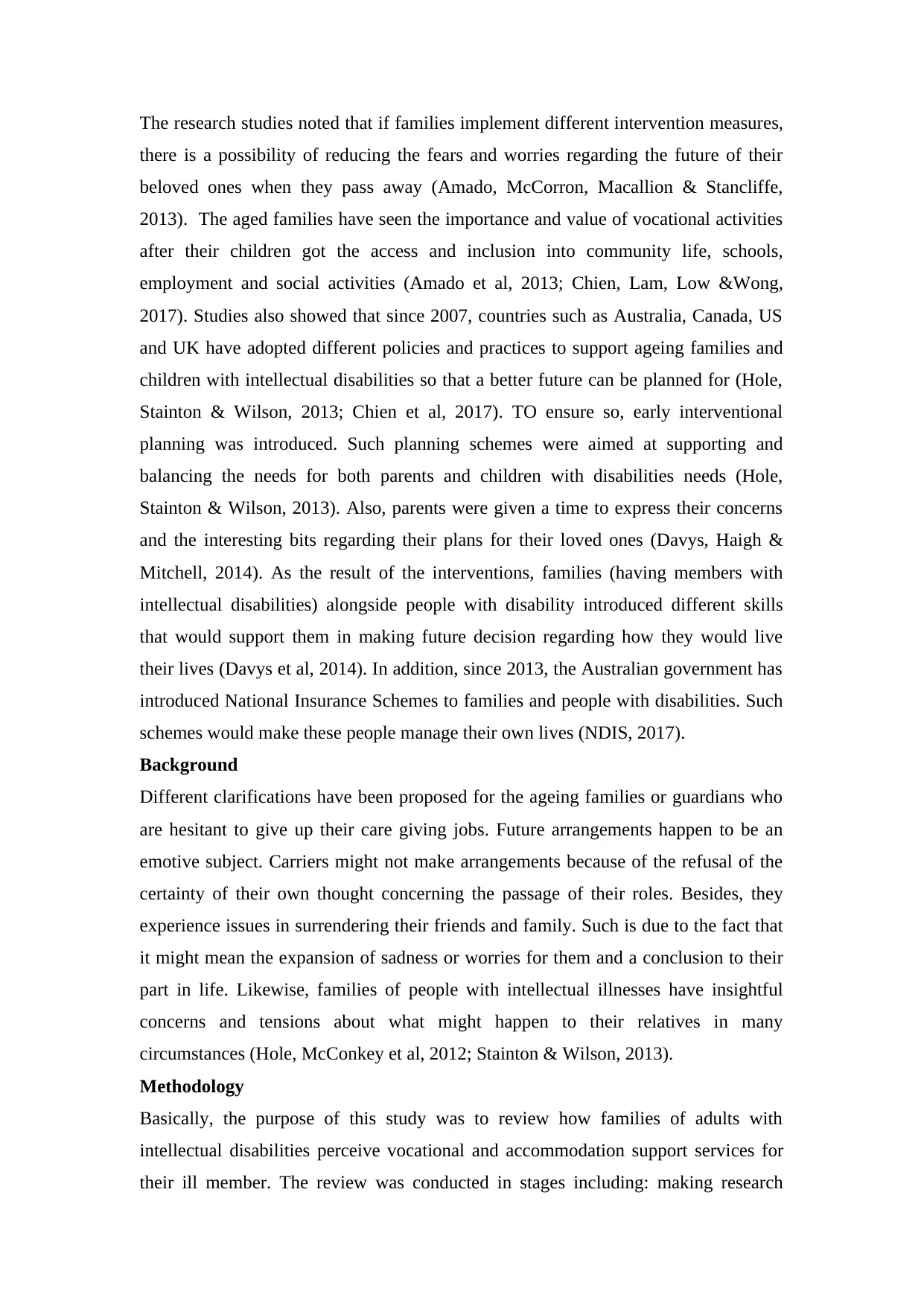
The research studies noted that if families implement different intervention measures,
there is a possibility of reducing the fears and worries regarding the future of their
beloved ones when they pass away (Amado, McCorron, Macallion & Stancliffe,
2013). The aged families have seen the importance and value of vocational activities
after their children got the access and inclusion into community life, schools,
employment and social activities (Amado et al, 2013; Chien, Lam, Low &Wong,
2017). Studies also showed that since 2007, countries such as Australia, Canada, US
and UK have adopted different policies and practices to support ageing families and
children with intellectual disabilities so that a better future can be planned for (Hole,
Stainton & Wilson, 2013; Chien et al, 2017). TO ensure so, early interventional
planning was introduced. Such planning schemes were aimed at supporting and
balancing the needs for both parents and children with disabilities needs (Hole,
Stainton & Wilson, 2013). Also, parents were given a time to express their concerns
and the interesting bits regarding their plans for their loved ones (Davys, Haigh &
Mitchell, 2014). As the result of the interventions, families (having members with
intellectual disabilities) alongside people with disability introduced different skills
that would support them in making future decision regarding how they would live
their lives (Davys et al, 2014). In addition, since 2013, the Australian government has
introduced National Insurance Schemes to families and people with disabilities. Such
schemes would make these people manage their own lives (NDIS, 2017).
Background
Different clarifications have been proposed for the ageing families or guardians who
are hesitant to give up their care giving jobs. Future arrangements happen to be an
emotive subject. Carriers might not make arrangements because of the refusal of the
certainty of their own thought concerning the passage of their roles. Besides, they
experience issues in surrendering their friends and family. Such is due to the fact that
it might mean the expansion of sadness or worries for them and a conclusion to their
part in life. Likewise, families of people with intellectual illnesses have insightful
concerns and tensions about what might happen to their relatives in many
circumstances (Hole, McConkey et al, 2012; Stainton & Wilson, 2013).
Methodology
Basically, the purpose of this study was to review how families of adults with
intellectual disabilities perceive vocational and accommodation support services for
their ill member. The review was conducted in stages including: making research
there is a possibility of reducing the fears and worries regarding the future of their
beloved ones when they pass away (Amado, McCorron, Macallion & Stancliffe,
2013). The aged families have seen the importance and value of vocational activities
after their children got the access and inclusion into community life, schools,
employment and social activities (Amado et al, 2013; Chien, Lam, Low &Wong,
2017). Studies also showed that since 2007, countries such as Australia, Canada, US
and UK have adopted different policies and practices to support ageing families and
children with intellectual disabilities so that a better future can be planned for (Hole,
Stainton & Wilson, 2013; Chien et al, 2017). TO ensure so, early interventional
planning was introduced. Such planning schemes were aimed at supporting and
balancing the needs for both parents and children with disabilities needs (Hole,
Stainton & Wilson, 2013). Also, parents were given a time to express their concerns
and the interesting bits regarding their plans for their loved ones (Davys, Haigh &
Mitchell, 2014). As the result of the interventions, families (having members with
intellectual disabilities) alongside people with disability introduced different skills
that would support them in making future decision regarding how they would live
their lives (Davys et al, 2014). In addition, since 2013, the Australian government has
introduced National Insurance Schemes to families and people with disabilities. Such
schemes would make these people manage their own lives (NDIS, 2017).
Background
Different clarifications have been proposed for the ageing families or guardians who
are hesitant to give up their care giving jobs. Future arrangements happen to be an
emotive subject. Carriers might not make arrangements because of the refusal of the
certainty of their own thought concerning the passage of their roles. Besides, they
experience issues in surrendering their friends and family. Such is due to the fact that
it might mean the expansion of sadness or worries for them and a conclusion to their
part in life. Likewise, families of people with intellectual illnesses have insightful
concerns and tensions about what might happen to their relatives in many
circumstances (Hole, McConkey et al, 2012; Stainton & Wilson, 2013).
Methodology
Basically, the purpose of this study was to review how families of adults with
intellectual disabilities perceive vocational and accommodation support services for
their ill member. The review was conducted in stages including: making research
Secure Best Marks with AI Grader
Need help grading? Try our AI Grader for instant feedback on your assignments.
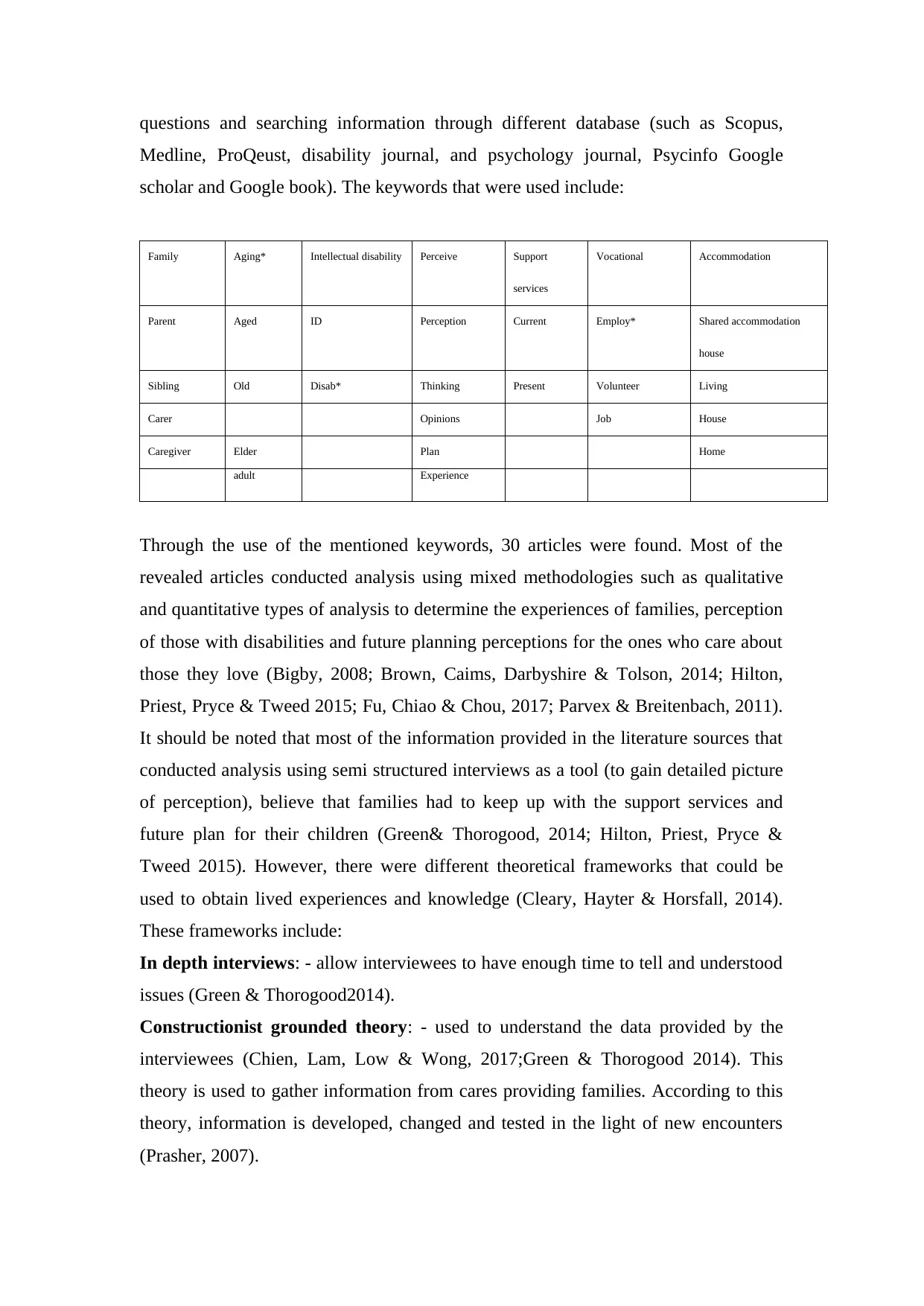
questions and searching information through different database (such as Scopus,
Medline, ProQeust, disability journal, and psychology journal, Psycinfo Google
scholar and Google book). The keywords that were used include:
Family Aging* Intellectual disability Perceive Support
services
Vocational Accommodation
Parent Aged ID Perception Current Employ* Shared accommodation
house
Sibling Old Disab* Thinking Present Volunteer Living
Carer Opinions Job House
Caregiver Elder Plan Home
adult Experience
Through the use of the mentioned keywords, 30 articles were found. Most of the
revealed articles conducted analysis using mixed methodologies such as qualitative
and quantitative types of analysis to determine the experiences of families, perception
of those with disabilities and future planning perceptions for the ones who care about
those they love (Bigby, 2008; Brown, Caims, Darbyshire & Tolson, 2014; Hilton,
Priest, Pryce & Tweed 2015; Fu, Chiao & Chou, 2017; Parvex & Breitenbach, 2011).
It should be noted that most of the information provided in the literature sources that
conducted analysis using semi structured interviews as a tool (to gain detailed picture
of perception), believe that families had to keep up with the support services and
future plan for their children (Green& Thorogood, 2014; Hilton, Priest, Pryce &
Tweed 2015). However, there were different theoretical frameworks that could be
used to obtain lived experiences and knowledge (Cleary, Hayter & Horsfall, 2014).
These frameworks include:
In depth interviews: - allow interviewees to have enough time to tell and understood
issues (Green & Thorogood2014).
Constructionist grounded theory: - used to understand the data provided by the
interviewees (Chien, Lam, Low & Wong, 2017;Green & Thorogood 2014). This
theory is used to gather information from cares providing families. According to this
theory, information is developed, changed and tested in the light of new encounters
(Prasher, 2007).
Medline, ProQeust, disability journal, and psychology journal, Psycinfo Google
scholar and Google book). The keywords that were used include:
Family Aging* Intellectual disability Perceive Support
services
Vocational Accommodation
Parent Aged ID Perception Current Employ* Shared accommodation
house
Sibling Old Disab* Thinking Present Volunteer Living
Carer Opinions Job House
Caregiver Elder Plan Home
adult Experience
Through the use of the mentioned keywords, 30 articles were found. Most of the
revealed articles conducted analysis using mixed methodologies such as qualitative
and quantitative types of analysis to determine the experiences of families, perception
of those with disabilities and future planning perceptions for the ones who care about
those they love (Bigby, 2008; Brown, Caims, Darbyshire & Tolson, 2014; Hilton,
Priest, Pryce & Tweed 2015; Fu, Chiao & Chou, 2017; Parvex & Breitenbach, 2011).
It should be noted that most of the information provided in the literature sources that
conducted analysis using semi structured interviews as a tool (to gain detailed picture
of perception), believe that families had to keep up with the support services and
future plan for their children (Green& Thorogood, 2014; Hilton, Priest, Pryce &
Tweed 2015). However, there were different theoretical frameworks that could be
used to obtain lived experiences and knowledge (Cleary, Hayter & Horsfall, 2014).
These frameworks include:
In depth interviews: - allow interviewees to have enough time to tell and understood
issues (Green & Thorogood2014).
Constructionist grounded theory: - used to understand the data provided by the
interviewees (Chien, Lam, Low & Wong, 2017;Green & Thorogood 2014). This
theory is used to gather information from cares providing families. According to this
theory, information is developed, changed and tested in the light of new encounters
(Prasher, 2007).
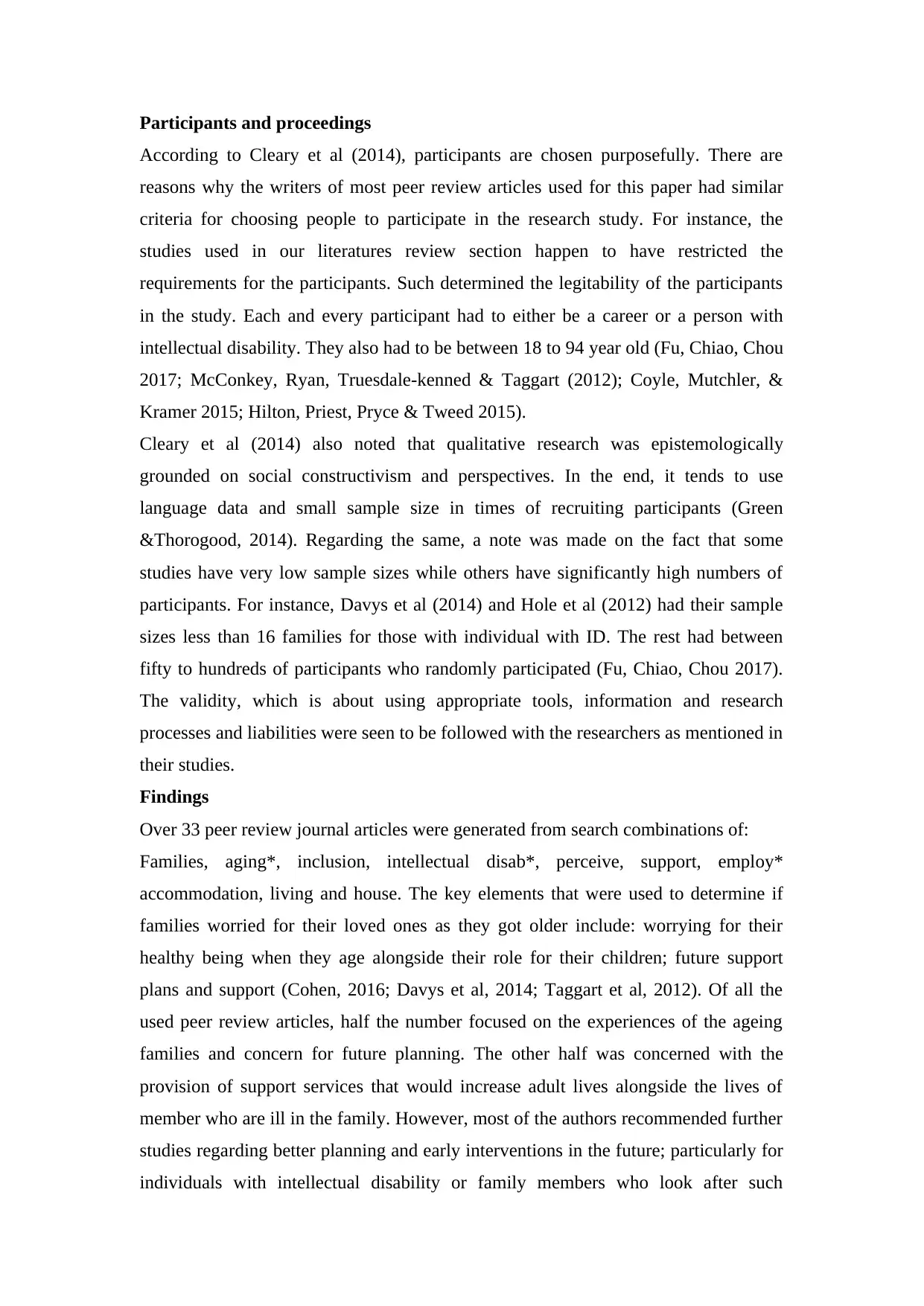
Participants and proceedings
According to Cleary et al (2014), participants are chosen purposefully. There are
reasons why the writers of most peer review articles used for this paper had similar
criteria for choosing people to participate in the research study. For instance, the
studies used in our literatures review section happen to have restricted the
requirements for the participants. Such determined the legitability of the participants
in the study. Each and every participant had to either be a career or a person with
intellectual disability. They also had to be between 18 to 94 year old (Fu, Chiao, Chou
2017; McConkey, Ryan, Truesdale-kenned & Taggart (2012); Coyle, Mutchler, &
Kramer 2015; Hilton, Priest, Pryce & Tweed 2015).
Cleary et al (2014) also noted that qualitative research was epistemologically
grounded on social constructivism and perspectives. In the end, it tends to use
language data and small sample size in times of recruiting participants (Green
&Thorogood, 2014). Regarding the same, a note was made on the fact that some
studies have very low sample sizes while others have significantly high numbers of
participants. For instance, Davys et al (2014) and Hole et al (2012) had their sample
sizes less than 16 families for those with individual with ID. The rest had between
fifty to hundreds of participants who randomly participated (Fu, Chiao, Chou 2017).
The validity, which is about using appropriate tools, information and research
processes and liabilities were seen to be followed with the researchers as mentioned in
their studies.
Findings
Over 33 peer review journal articles were generated from search combinations of:
Families, aging*, inclusion, intellectual disab*, perceive, support, employ*
accommodation, living and house. The key elements that were used to determine if
families worried for their loved ones as they got older include: worrying for their
healthy being when they age alongside their role for their children; future support
plans and support (Cohen, 2016; Davys et al, 2014; Taggart et al, 2012). Of all the
used peer review articles, half the number focused on the experiences of the ageing
families and concern for future planning. The other half was concerned with the
provision of support services that would increase adult lives alongside the lives of
member who are ill in the family. However, most of the authors recommended further
studies regarding better planning and early interventions in the future; particularly for
individuals with intellectual disability or family members who look after such
According to Cleary et al (2014), participants are chosen purposefully. There are
reasons why the writers of most peer review articles used for this paper had similar
criteria for choosing people to participate in the research study. For instance, the
studies used in our literatures review section happen to have restricted the
requirements for the participants. Such determined the legitability of the participants
in the study. Each and every participant had to either be a career or a person with
intellectual disability. They also had to be between 18 to 94 year old (Fu, Chiao, Chou
2017; McConkey, Ryan, Truesdale-kenned & Taggart (2012); Coyle, Mutchler, &
Kramer 2015; Hilton, Priest, Pryce & Tweed 2015).
Cleary et al (2014) also noted that qualitative research was epistemologically
grounded on social constructivism and perspectives. In the end, it tends to use
language data and small sample size in times of recruiting participants (Green
&Thorogood, 2014). Regarding the same, a note was made on the fact that some
studies have very low sample sizes while others have significantly high numbers of
participants. For instance, Davys et al (2014) and Hole et al (2012) had their sample
sizes less than 16 families for those with individual with ID. The rest had between
fifty to hundreds of participants who randomly participated (Fu, Chiao, Chou 2017).
The validity, which is about using appropriate tools, information and research
processes and liabilities were seen to be followed with the researchers as mentioned in
their studies.
Findings
Over 33 peer review journal articles were generated from search combinations of:
Families, aging*, inclusion, intellectual disab*, perceive, support, employ*
accommodation, living and house. The key elements that were used to determine if
families worried for their loved ones as they got older include: worrying for their
healthy being when they age alongside their role for their children; future support
plans and support (Cohen, 2016; Davys et al, 2014; Taggart et al, 2012). Of all the
used peer review articles, half the number focused on the experiences of the ageing
families and concern for future planning. The other half was concerned with the
provision of support services that would increase adult lives alongside the lives of
member who are ill in the family. However, most of the authors recommended further
studies regarding better planning and early interventions in the future; particularly for
individuals with intellectual disability or family members who look after such
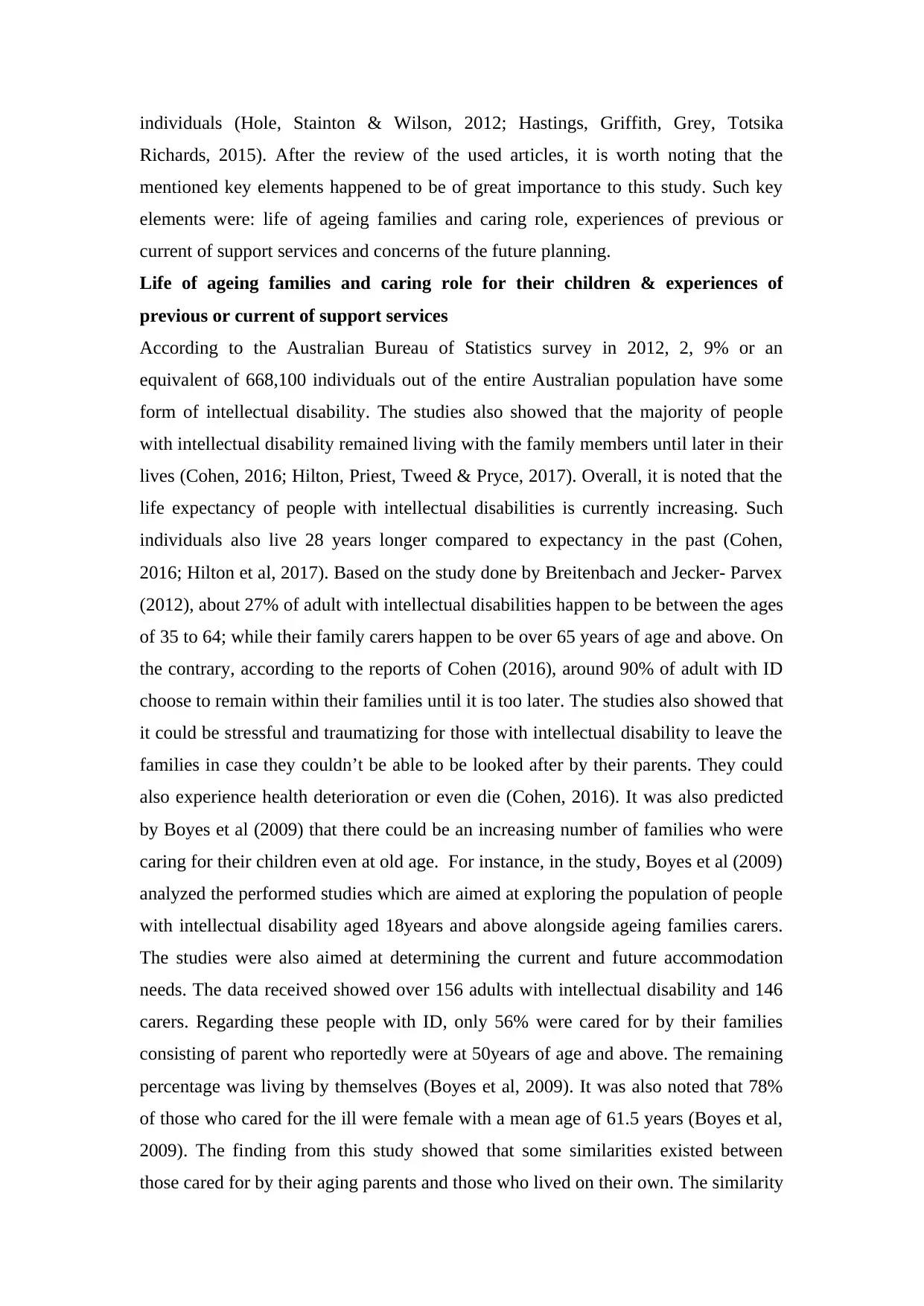
individuals (Hole, Stainton & Wilson, 2012; Hastings, Griffith, Grey, Totsika
Richards, 2015). After the review of the used articles, it is worth noting that the
mentioned key elements happened to be of great importance to this study. Such key
elements were: life of ageing families and caring role, experiences of previous or
current of support services and concerns of the future planning.
Life of ageing families and caring role for their children & experiences of
previous or current of support services
According to the Australian Bureau of Statistics survey in 2012, 2, 9% or an
equivalent of 668,100 individuals out of the entire Australian population have some
form of intellectual disability. The studies also showed that the majority of people
with intellectual disability remained living with the family members until later in their
lives (Cohen, 2016; Hilton, Priest, Tweed & Pryce, 2017). Overall, it is noted that the
life expectancy of people with intellectual disabilities is currently increasing. Such
individuals also live 28 years longer compared to expectancy in the past (Cohen,
2016; Hilton et al, 2017). Based on the study done by Breitenbach and Jecker- Parvex
(2012), about 27% of adult with intellectual disabilities happen to be between the ages
of 35 to 64; while their family carers happen to be over 65 years of age and above. On
the contrary, according to the reports of Cohen (2016), around 90% of adult with ID
choose to remain within their families until it is too later. The studies also showed that
it could be stressful and traumatizing for those with intellectual disability to leave the
families in case they couldn’t be able to be looked after by their parents. They could
also experience health deterioration or even die (Cohen, 2016). It was also predicted
by Boyes et al (2009) that there could be an increasing number of families who were
caring for their children even at old age. For instance, in the study, Boyes et al (2009)
analyzed the performed studies which are aimed at exploring the population of people
with intellectual disability aged 18years and above alongside ageing families carers.
The studies were also aimed at determining the current and future accommodation
needs. The data received showed over 156 adults with intellectual disability and 146
carers. Regarding these people with ID, only 56% were cared for by their families
consisting of parent who reportedly were at 50years of age and above. The remaining
percentage was living by themselves (Boyes et al, 2009). It was also noted that 78%
of those who cared for the ill were female with a mean age of 61.5 years (Boyes et al,
2009). The finding from this study showed that some similarities existed between
those cared for by their aging parents and those who lived on their own. The similarity
Richards, 2015). After the review of the used articles, it is worth noting that the
mentioned key elements happened to be of great importance to this study. Such key
elements were: life of ageing families and caring role, experiences of previous or
current of support services and concerns of the future planning.
Life of ageing families and caring role for their children & experiences of
previous or current of support services
According to the Australian Bureau of Statistics survey in 2012, 2, 9% or an
equivalent of 668,100 individuals out of the entire Australian population have some
form of intellectual disability. The studies also showed that the majority of people
with intellectual disability remained living with the family members until later in their
lives (Cohen, 2016; Hilton, Priest, Tweed & Pryce, 2017). Overall, it is noted that the
life expectancy of people with intellectual disabilities is currently increasing. Such
individuals also live 28 years longer compared to expectancy in the past (Cohen,
2016; Hilton et al, 2017). Based on the study done by Breitenbach and Jecker- Parvex
(2012), about 27% of adult with intellectual disabilities happen to be between the ages
of 35 to 64; while their family carers happen to be over 65 years of age and above. On
the contrary, according to the reports of Cohen (2016), around 90% of adult with ID
choose to remain within their families until it is too later. The studies also showed that
it could be stressful and traumatizing for those with intellectual disability to leave the
families in case they couldn’t be able to be looked after by their parents. They could
also experience health deterioration or even die (Cohen, 2016). It was also predicted
by Boyes et al (2009) that there could be an increasing number of families who were
caring for their children even at old age. For instance, in the study, Boyes et al (2009)
analyzed the performed studies which are aimed at exploring the population of people
with intellectual disability aged 18years and above alongside ageing families carers.
The studies were also aimed at determining the current and future accommodation
needs. The data received showed over 156 adults with intellectual disability and 146
carers. Regarding these people with ID, only 56% were cared for by their families
consisting of parent who reportedly were at 50years of age and above. The remaining
percentage was living by themselves (Boyes et al, 2009). It was also noted that 78%
of those who cared for the ill were female with a mean age of 61.5 years (Boyes et al,
2009). The finding from this study showed that some similarities existed between
those cared for by their aging parents and those who lived on their own. The similarity
Paraphrase This Document
Need a fresh take? Get an instant paraphrase of this document with our AI Paraphraser
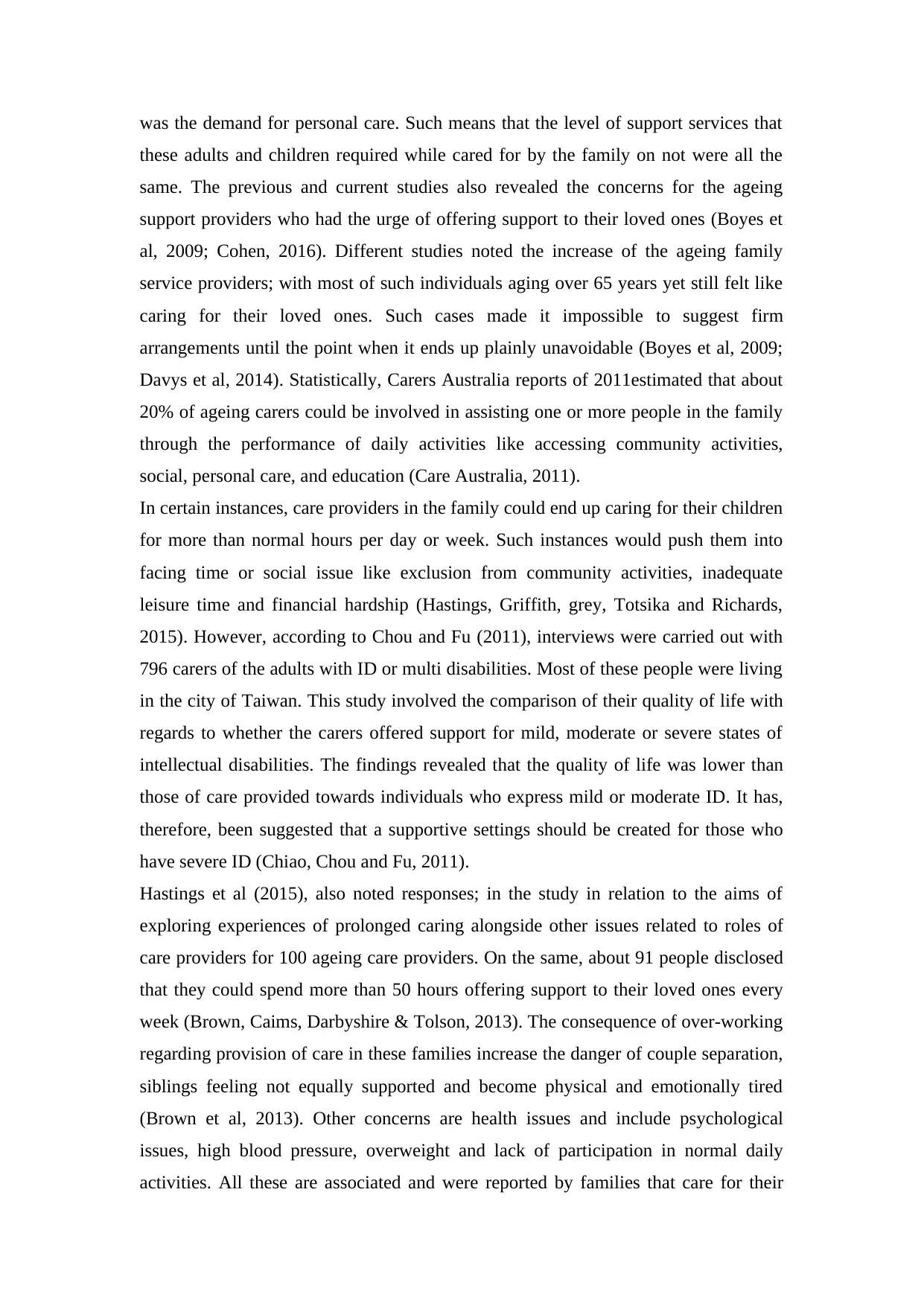
was the demand for personal care. Such means that the level of support services that
these adults and children required while cared for by the family on not were all the
same. The previous and current studies also revealed the concerns for the ageing
support providers who had the urge of offering support to their loved ones (Boyes et
al, 2009; Cohen, 2016). Different studies noted the increase of the ageing family
service providers; with most of such individuals aging over 65 years yet still felt like
caring for their loved ones. Such cases made it impossible to suggest firm
arrangements until the point when it ends up plainly unavoidable (Boyes et al, 2009;
Davys et al, 2014). Statistically, Carers Australia reports of 2011estimated that about
20% of ageing carers could be involved in assisting one or more people in the family
through the performance of daily activities like accessing community activities,
social, personal care, and education (Care Australia, 2011).
In certain instances, care providers in the family could end up caring for their children
for more than normal hours per day or week. Such instances would push them into
facing time or social issue like exclusion from community activities, inadequate
leisure time and financial hardship (Hastings, Griffith, grey, Totsika and Richards,
2015). However, according to Chou and Fu (2011), interviews were carried out with
796 carers of the adults with ID or multi disabilities. Most of these people were living
in the city of Taiwan. This study involved the comparison of their quality of life with
regards to whether the carers offered support for mild, moderate or severe states of
intellectual disabilities. The findings revealed that the quality of life was lower than
those of care provided towards individuals who express mild or moderate ID. It has,
therefore, been suggested that a supportive settings should be created for those who
have severe ID (Chiao, Chou and Fu, 2011).
Hastings et al (2015), also noted responses; in the study in relation to the aims of
exploring experiences of prolonged caring alongside other issues related to roles of
care providers for 100 ageing care providers. On the same, about 91 people disclosed
that they could spend more than 50 hours offering support to their loved ones every
week (Brown, Caims, Darbyshire & Tolson, 2013). The consequence of over-working
regarding provision of care in these families increase the danger of couple separation,
siblings feeling not equally supported and become physical and emotionally tired
(Brown et al, 2013). Other concerns are health issues and include psychological
issues, high blood pressure, overweight and lack of participation in normal daily
activities. All these are associated and were reported by families that care for their
these adults and children required while cared for by the family on not were all the
same. The previous and current studies also revealed the concerns for the ageing
support providers who had the urge of offering support to their loved ones (Boyes et
al, 2009; Cohen, 2016). Different studies noted the increase of the ageing family
service providers; with most of such individuals aging over 65 years yet still felt like
caring for their loved ones. Such cases made it impossible to suggest firm
arrangements until the point when it ends up plainly unavoidable (Boyes et al, 2009;
Davys et al, 2014). Statistically, Carers Australia reports of 2011estimated that about
20% of ageing carers could be involved in assisting one or more people in the family
through the performance of daily activities like accessing community activities,
social, personal care, and education (Care Australia, 2011).
In certain instances, care providers in the family could end up caring for their children
for more than normal hours per day or week. Such instances would push them into
facing time or social issue like exclusion from community activities, inadequate
leisure time and financial hardship (Hastings, Griffith, grey, Totsika and Richards,
2015). However, according to Chou and Fu (2011), interviews were carried out with
796 carers of the adults with ID or multi disabilities. Most of these people were living
in the city of Taiwan. This study involved the comparison of their quality of life with
regards to whether the carers offered support for mild, moderate or severe states of
intellectual disabilities. The findings revealed that the quality of life was lower than
those of care provided towards individuals who express mild or moderate ID. It has,
therefore, been suggested that a supportive settings should be created for those who
have severe ID (Chiao, Chou and Fu, 2011).
Hastings et al (2015), also noted responses; in the study in relation to the aims of
exploring experiences of prolonged caring alongside other issues related to roles of
care providers for 100 ageing care providers. On the same, about 91 people disclosed
that they could spend more than 50 hours offering support to their loved ones every
week (Brown, Caims, Darbyshire & Tolson, 2013). The consequence of over-working
regarding provision of care in these families increase the danger of couple separation,
siblings feeling not equally supported and become physical and emotionally tired
(Brown et al, 2013). Other concerns are health issues and include psychological
issues, high blood pressure, overweight and lack of participation in normal daily
activities. All these are associated and were reported by families that care for their
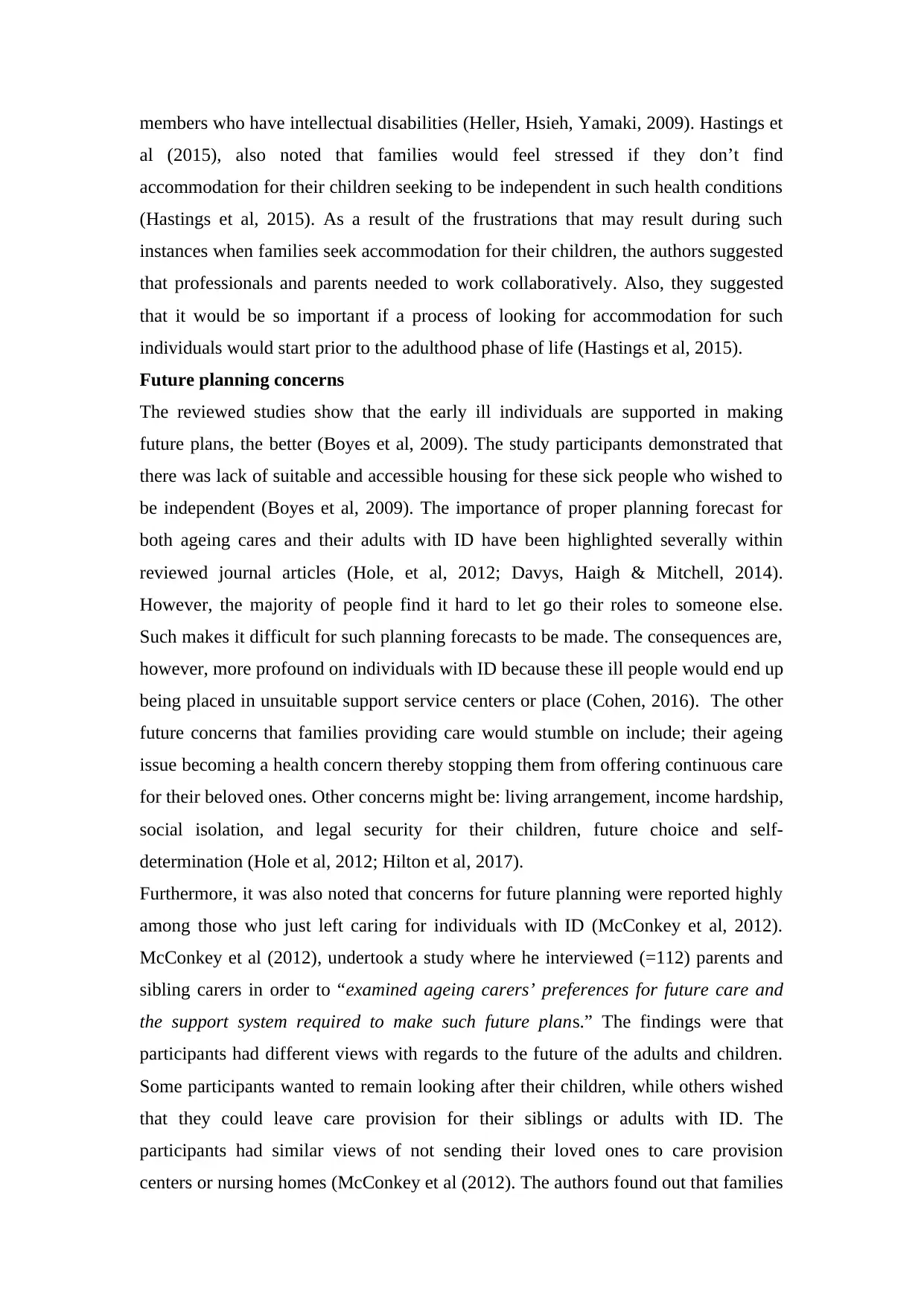
members who have intellectual disabilities (Heller, Hsieh, Yamaki, 2009). Hastings et
al (2015), also noted that families would feel stressed if they don’t find
accommodation for their children seeking to be independent in such health conditions
(Hastings et al, 2015). As a result of the frustrations that may result during such
instances when families seek accommodation for their children, the authors suggested
that professionals and parents needed to work collaboratively. Also, they suggested
that it would be so important if a process of looking for accommodation for such
individuals would start prior to the adulthood phase of life (Hastings et al, 2015).
Future planning concerns
The reviewed studies show that the early ill individuals are supported in making
future plans, the better (Boyes et al, 2009). The study participants demonstrated that
there was lack of suitable and accessible housing for these sick people who wished to
be independent (Boyes et al, 2009). The importance of proper planning forecast for
both ageing cares and their adults with ID have been highlighted severally within
reviewed journal articles (Hole, et al, 2012; Davys, Haigh & Mitchell, 2014).
However, the majority of people find it hard to let go their roles to someone else.
Such makes it difficult for such planning forecasts to be made. The consequences are,
however, more profound on individuals with ID because these ill people would end up
being placed in unsuitable support service centers or place (Cohen, 2016). The other
future concerns that families providing care would stumble on include; their ageing
issue becoming a health concern thereby stopping them from offering continuous care
for their beloved ones. Other concerns might be: living arrangement, income hardship,
social isolation, and legal security for their children, future choice and self-
determination (Hole et al, 2012; Hilton et al, 2017).
Furthermore, it was also noted that concerns for future planning were reported highly
among those who just left caring for individuals with ID (McConkey et al, 2012).
McConkey et al (2012), undertook a study where he interviewed (=112) parents and
sibling carers in order to “examined ageing carers’ preferences for future care and
the support system required to make such future plans.” The findings were that
participants had different views with regards to the future of the adults and children.
Some participants wanted to remain looking after their children, while others wished
that they could leave care provision for their siblings or adults with ID. The
participants had similar views of not sending their loved ones to care provision
centers or nursing homes (McConkey et al (2012). The authors found out that families
al (2015), also noted that families would feel stressed if they don’t find
accommodation for their children seeking to be independent in such health conditions
(Hastings et al, 2015). As a result of the frustrations that may result during such
instances when families seek accommodation for their children, the authors suggested
that professionals and parents needed to work collaboratively. Also, they suggested
that it would be so important if a process of looking for accommodation for such
individuals would start prior to the adulthood phase of life (Hastings et al, 2015).
Future planning concerns
The reviewed studies show that the early ill individuals are supported in making
future plans, the better (Boyes et al, 2009). The study participants demonstrated that
there was lack of suitable and accessible housing for these sick people who wished to
be independent (Boyes et al, 2009). The importance of proper planning forecast for
both ageing cares and their adults with ID have been highlighted severally within
reviewed journal articles (Hole, et al, 2012; Davys, Haigh & Mitchell, 2014).
However, the majority of people find it hard to let go their roles to someone else.
Such makes it difficult for such planning forecasts to be made. The consequences are,
however, more profound on individuals with ID because these ill people would end up
being placed in unsuitable support service centers or place (Cohen, 2016). The other
future concerns that families providing care would stumble on include; their ageing
issue becoming a health concern thereby stopping them from offering continuous care
for their beloved ones. Other concerns might be: living arrangement, income hardship,
social isolation, and legal security for their children, future choice and self-
determination (Hole et al, 2012; Hilton et al, 2017).
Furthermore, it was also noted that concerns for future planning were reported highly
among those who just left caring for individuals with ID (McConkey et al, 2012).
McConkey et al (2012), undertook a study where he interviewed (=112) parents and
sibling carers in order to “examined ageing carers’ preferences for future care and
the support system required to make such future plans.” The findings were that
participants had different views with regards to the future of the adults and children.
Some participants wanted to remain looking after their children, while others wished
that they could leave care provision for their siblings or adults with ID. The
participants had similar views of not sending their loved ones to care provision
centers or nursing homes (McConkey et al (2012). The authors found out that families
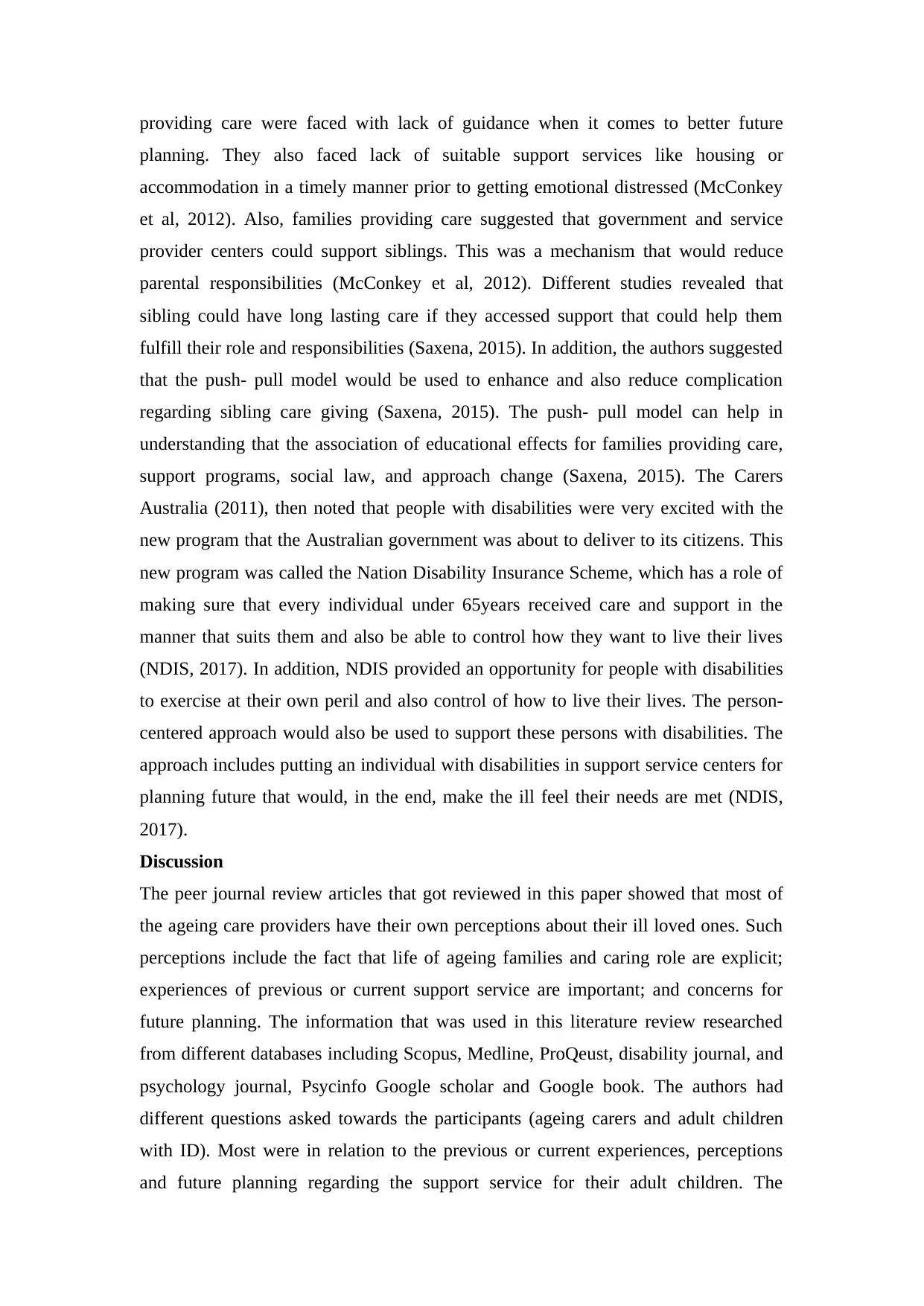
providing care were faced with lack of guidance when it comes to better future
planning. They also faced lack of suitable support services like housing or
accommodation in a timely manner prior to getting emotional distressed (McConkey
et al, 2012). Also, families providing care suggested that government and service
provider centers could support siblings. This was a mechanism that would reduce
parental responsibilities (McConkey et al, 2012). Different studies revealed that
sibling could have long lasting care if they accessed support that could help them
fulfill their role and responsibilities (Saxena, 2015). In addition, the authors suggested
that the push- pull model would be used to enhance and also reduce complication
regarding sibling care giving (Saxena, 2015). The push- pull model can help in
understanding that the association of educational effects for families providing care,
support programs, social law, and approach change (Saxena, 2015). The Carers
Australia (2011), then noted that people with disabilities were very excited with the
new program that the Australian government was about to deliver to its citizens. This
new program was called the Nation Disability Insurance Scheme, which has a role of
making sure that every individual under 65years received care and support in the
manner that suits them and also be able to control how they want to live their lives
(NDIS, 2017). In addition, NDIS provided an opportunity for people with disabilities
to exercise at their own peril and also control of how to live their lives. The person-
centered approach would also be used to support these persons with disabilities. The
approach includes putting an individual with disabilities in support service centers for
planning future that would, in the end, make the ill feel their needs are met (NDIS,
2017).
Discussion
The peer journal review articles that got reviewed in this paper showed that most of
the ageing care providers have their own perceptions about their ill loved ones. Such
perceptions include the fact that life of ageing families and caring role are explicit;
experiences of previous or current support service are important; and concerns for
future planning. The information that was used in this literature review researched
from different databases including Scopus, Medline, ProQeust, disability journal, and
psychology journal, Psycinfo Google scholar and Google book. The authors had
different questions asked towards the participants (ageing carers and adult children
with ID). Most were in relation to the previous or current experiences, perceptions
and future planning regarding the support service for their adult children. The
planning. They also faced lack of suitable support services like housing or
accommodation in a timely manner prior to getting emotional distressed (McConkey
et al, 2012). Also, families providing care suggested that government and service
provider centers could support siblings. This was a mechanism that would reduce
parental responsibilities (McConkey et al, 2012). Different studies revealed that
sibling could have long lasting care if they accessed support that could help them
fulfill their role and responsibilities (Saxena, 2015). In addition, the authors suggested
that the push- pull model would be used to enhance and also reduce complication
regarding sibling care giving (Saxena, 2015). The push- pull model can help in
understanding that the association of educational effects for families providing care,
support programs, social law, and approach change (Saxena, 2015). The Carers
Australia (2011), then noted that people with disabilities were very excited with the
new program that the Australian government was about to deliver to its citizens. This
new program was called the Nation Disability Insurance Scheme, which has a role of
making sure that every individual under 65years received care and support in the
manner that suits them and also be able to control how they want to live their lives
(NDIS, 2017). In addition, NDIS provided an opportunity for people with disabilities
to exercise at their own peril and also control of how to live their lives. The person-
centered approach would also be used to support these persons with disabilities. The
approach includes putting an individual with disabilities in support service centers for
planning future that would, in the end, make the ill feel their needs are met (NDIS,
2017).
Discussion
The peer journal review articles that got reviewed in this paper showed that most of
the ageing care providers have their own perceptions about their ill loved ones. Such
perceptions include the fact that life of ageing families and caring role are explicit;
experiences of previous or current support service are important; and concerns for
future planning. The information that was used in this literature review researched
from different databases including Scopus, Medline, ProQeust, disability journal, and
psychology journal, Psycinfo Google scholar and Google book. The authors had
different questions asked towards the participants (ageing carers and adult children
with ID). Most were in relation to the previous or current experiences, perceptions
and future planning regarding the support service for their adult children. The
Secure Best Marks with AI Grader
Need help grading? Try our AI Grader for instant feedback on your assignments.
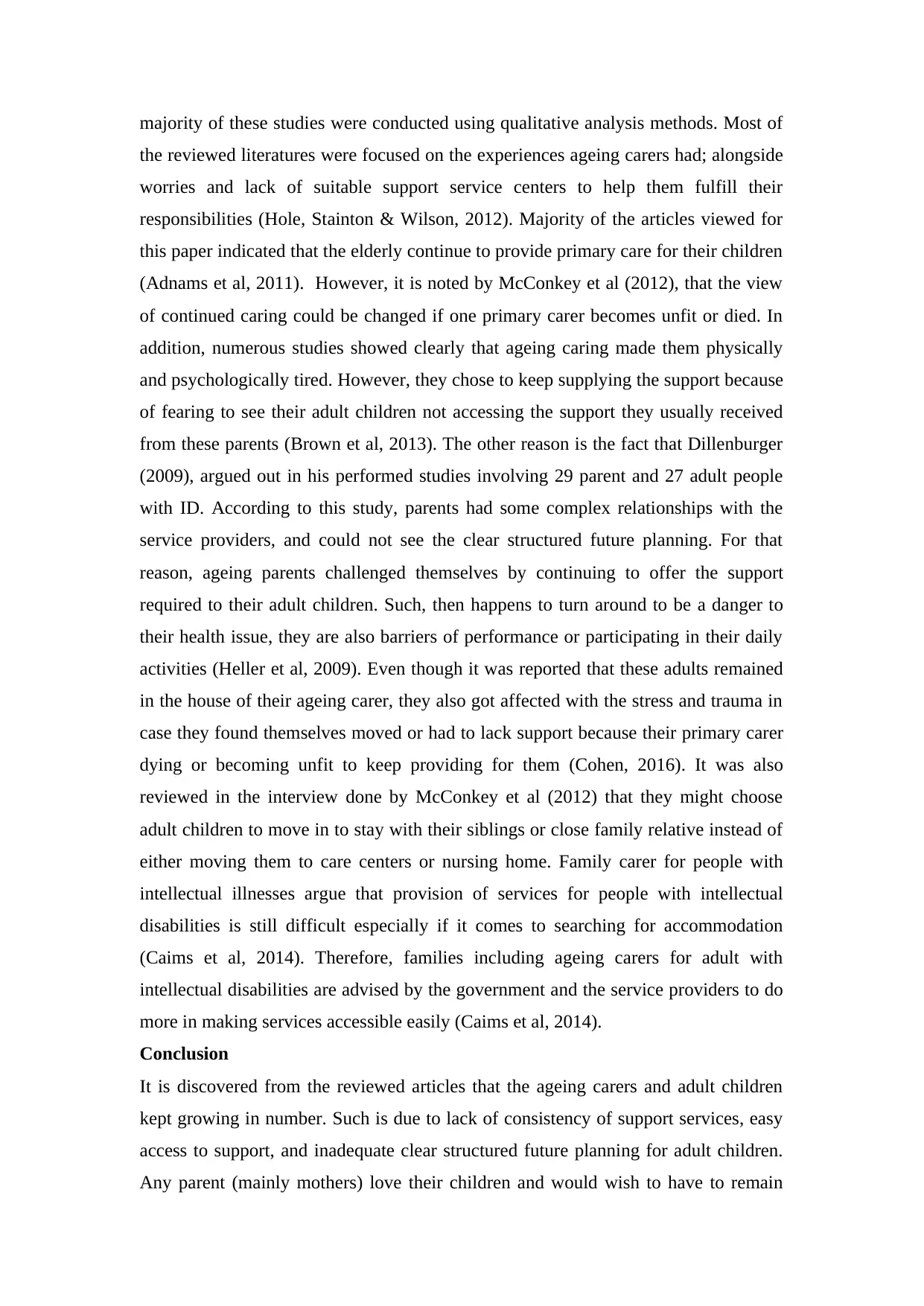
majority of these studies were conducted using qualitative analysis methods. Most of
the reviewed literatures were focused on the experiences ageing carers had; alongside
worries and lack of suitable support service centers to help them fulfill their
responsibilities (Hole, Stainton & Wilson, 2012). Majority of the articles viewed for
this paper indicated that the elderly continue to provide primary care for their children
(Adnams et al, 2011). However, it is noted by McConkey et al (2012), that the view
of continued caring could be changed if one primary carer becomes unfit or died. In
addition, numerous studies showed clearly that ageing caring made them physically
and psychologically tired. However, they chose to keep supplying the support because
of fearing to see their adult children not accessing the support they usually received
from these parents (Brown et al, 2013). The other reason is the fact that Dillenburger
(2009), argued out in his performed studies involving 29 parent and 27 adult people
with ID. According to this study, parents had some complex relationships with the
service providers, and could not see the clear structured future planning. For that
reason, ageing parents challenged themselves by continuing to offer the support
required to their adult children. Such, then happens to turn around to be a danger to
their health issue, they are also barriers of performance or participating in their daily
activities (Heller et al, 2009). Even though it was reported that these adults remained
in the house of their ageing carer, they also got affected with the stress and trauma in
case they found themselves moved or had to lack support because their primary carer
dying or becoming unfit to keep providing for them (Cohen, 2016). It was also
reviewed in the interview done by McConkey et al (2012) that they might choose
adult children to move in to stay with their siblings or close family relative instead of
either moving them to care centers or nursing home. Family carer for people with
intellectual illnesses argue that provision of services for people with intellectual
disabilities is still difficult especially if it comes to searching for accommodation
(Caims et al, 2014). Therefore, families including ageing carers for adult with
intellectual disabilities are advised by the government and the service providers to do
more in making services accessible easily (Caims et al, 2014).
Conclusion
It is discovered from the reviewed articles that the ageing carers and adult children
kept growing in number. Such is due to lack of consistency of support services, easy
access to support, and inadequate clear structured future planning for adult children.
Any parent (mainly mothers) love their children and would wish to have to remain
the reviewed literatures were focused on the experiences ageing carers had; alongside
worries and lack of suitable support service centers to help them fulfill their
responsibilities (Hole, Stainton & Wilson, 2012). Majority of the articles viewed for
this paper indicated that the elderly continue to provide primary care for their children
(Adnams et al, 2011). However, it is noted by McConkey et al (2012), that the view
of continued caring could be changed if one primary carer becomes unfit or died. In
addition, numerous studies showed clearly that ageing caring made them physically
and psychologically tired. However, they chose to keep supplying the support because
of fearing to see their adult children not accessing the support they usually received
from these parents (Brown et al, 2013). The other reason is the fact that Dillenburger
(2009), argued out in his performed studies involving 29 parent and 27 adult people
with ID. According to this study, parents had some complex relationships with the
service providers, and could not see the clear structured future planning. For that
reason, ageing parents challenged themselves by continuing to offer the support
required to their adult children. Such, then happens to turn around to be a danger to
their health issue, they are also barriers of performance or participating in their daily
activities (Heller et al, 2009). Even though it was reported that these adults remained
in the house of their ageing carer, they also got affected with the stress and trauma in
case they found themselves moved or had to lack support because their primary carer
dying or becoming unfit to keep providing for them (Cohen, 2016). It was also
reviewed in the interview done by McConkey et al (2012) that they might choose
adult children to move in to stay with their siblings or close family relative instead of
either moving them to care centers or nursing home. Family carer for people with
intellectual illnesses argue that provision of services for people with intellectual
disabilities is still difficult especially if it comes to searching for accommodation
(Caims et al, 2014). Therefore, families including ageing carers for adult with
intellectual disabilities are advised by the government and the service providers to do
more in making services accessible easily (Caims et al, 2014).
Conclusion
It is discovered from the reviewed articles that the ageing carers and adult children
kept growing in number. Such is due to lack of consistency of support services, easy
access to support, and inadequate clear structured future planning for adult children.
Any parent (mainly mothers) love their children and would wish to have to remain
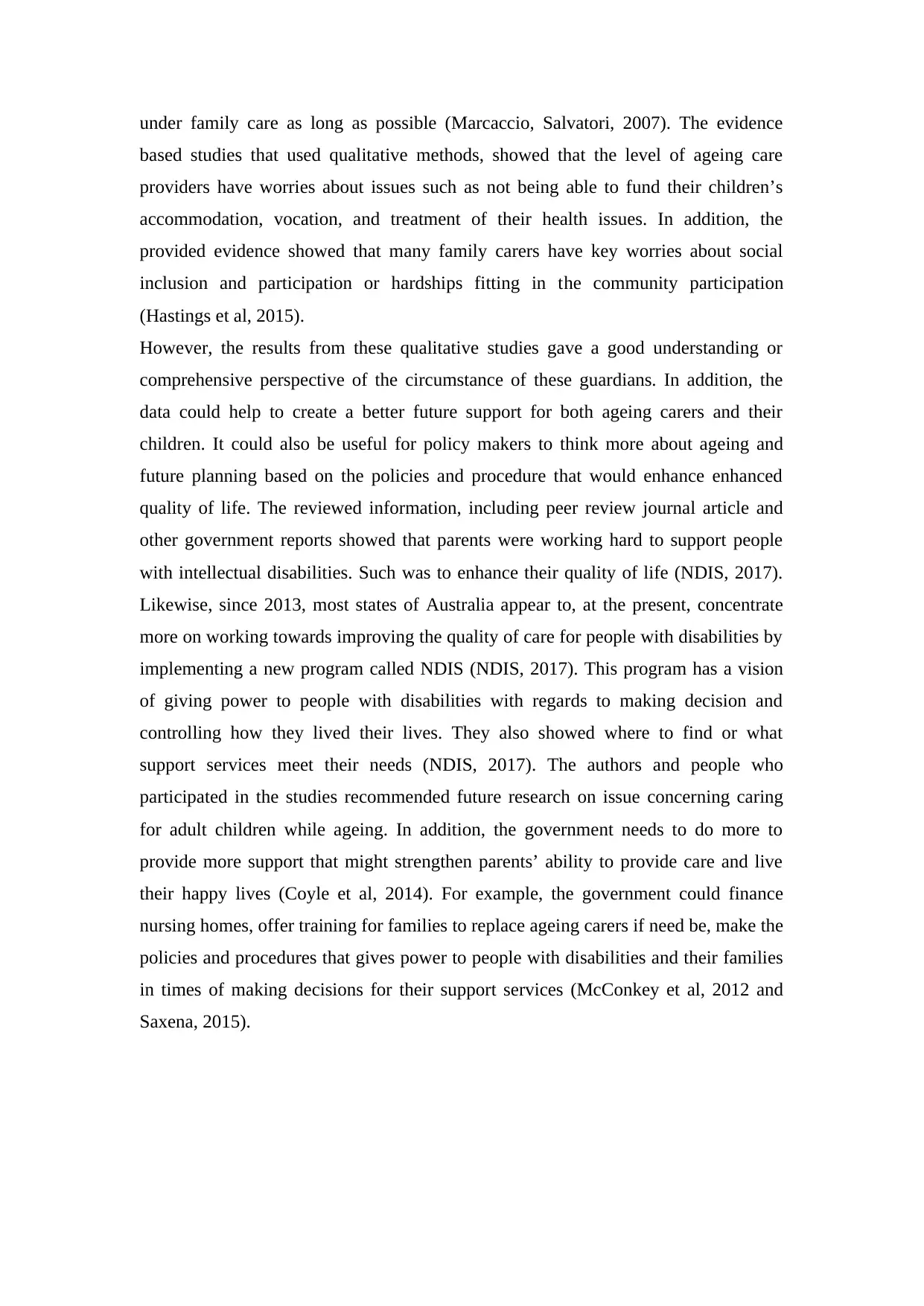
under family care as long as possible (Marcaccio, Salvatori, 2007). The evidence
based studies that used qualitative methods, showed that the level of ageing care
providers have worries about issues such as not being able to fund their children’s
accommodation, vocation, and treatment of their health issues. In addition, the
provided evidence showed that many family carers have key worries about social
inclusion and participation or hardships fitting in the community participation
(Hastings et al, 2015).
However, the results from these qualitative studies gave a good understanding or
comprehensive perspective of the circumstance of these guardians. In addition, the
data could help to create a better future support for both ageing carers and their
children. It could also be useful for policy makers to think more about ageing and
future planning based on the policies and procedure that would enhance enhanced
quality of life. The reviewed information, including peer review journal article and
other government reports showed that parents were working hard to support people
with intellectual disabilities. Such was to enhance their quality of life (NDIS, 2017).
Likewise, since 2013, most states of Australia appear to, at the present, concentrate
more on working towards improving the quality of care for people with disabilities by
implementing a new program called NDIS (NDIS, 2017). This program has a vision
of giving power to people with disabilities with regards to making decision and
controlling how they lived their lives. They also showed where to find or what
support services meet their needs (NDIS, 2017). The authors and people who
participated in the studies recommended future research on issue concerning caring
for adult children while ageing. In addition, the government needs to do more to
provide more support that might strengthen parents’ ability to provide care and live
their happy lives (Coyle et al, 2014). For example, the government could finance
nursing homes, offer training for families to replace ageing carers if need be, make the
policies and procedures that gives power to people with disabilities and their families
in times of making decisions for their support services (McConkey et al, 2012 and
Saxena, 2015).
based studies that used qualitative methods, showed that the level of ageing care
providers have worries about issues such as not being able to fund their children’s
accommodation, vocation, and treatment of their health issues. In addition, the
provided evidence showed that many family carers have key worries about social
inclusion and participation or hardships fitting in the community participation
(Hastings et al, 2015).
However, the results from these qualitative studies gave a good understanding or
comprehensive perspective of the circumstance of these guardians. In addition, the
data could help to create a better future support for both ageing carers and their
children. It could also be useful for policy makers to think more about ageing and
future planning based on the policies and procedure that would enhance enhanced
quality of life. The reviewed information, including peer review journal article and
other government reports showed that parents were working hard to support people
with intellectual disabilities. Such was to enhance their quality of life (NDIS, 2017).
Likewise, since 2013, most states of Australia appear to, at the present, concentrate
more on working towards improving the quality of care for people with disabilities by
implementing a new program called NDIS (NDIS, 2017). This program has a vision
of giving power to people with disabilities with regards to making decision and
controlling how they lived their lives. They also showed where to find or what
support services meet their needs (NDIS, 2017). The authors and people who
participated in the studies recommended future research on issue concerning caring
for adult children while ageing. In addition, the government needs to do more to
provide more support that might strengthen parents’ ability to provide care and live
their happy lives (Coyle et al, 2014). For example, the government could finance
nursing homes, offer training for families to replace ageing carers if need be, make the
policies and procedures that gives power to people with disabilities and their families
in times of making decisions for their support services (McConkey et al, 2012 and
Saxena, 2015).
1 out of 12
Related Documents
Your All-in-One AI-Powered Toolkit for Academic Success.
+13062052269
info@desklib.com
Available 24*7 on WhatsApp / Email
![[object Object]](/_next/static/media/star-bottom.7253800d.svg)
Unlock your academic potential
© 2024 | Zucol Services PVT LTD | All rights reserved.





